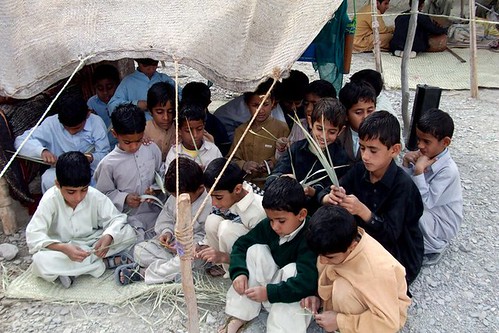Half of Children in Balochistan Denied Education
 Balochistan, a southwest province of Pakistan, is experiencing an educational crisis with half of the population being denied access to an education. With shortages of schools, facilities, teachers, and supplies, many areas of the province have illiteracy rates as high as 90%.
Balochistan, a southwest province of Pakistan, is experiencing an educational crisis with half of the population being denied access to an education. With shortages of schools, facilities, teachers, and supplies, many areas of the province have illiteracy rates as high as 90%.
Balochistan has 22,000 settlements that are served by only 12,600 government run schools and 57,000 teachers. This scarcity of schools and teachers deprives children of their right to an education.
According to Sardar Raza Muhammad Bareech, adviser to the Chief Minister of Balochistan, “there is no light at the end of the tunnel…We have to recuit 60,000 teachers to overcome the educational crisis” and the government needs to build an additional 10,000 schools. Without support from the federal government, the provincial government does not have the resources to finance the needed educational reforms.
Even existing schools fail to provide adequate education due to a lack of supplies and basic facilities. Many of these schools lack furniture, heat, toilets or running water. This week, following visits to government schools that revealed these dire conditions, Balochistan’s Chief Minister Dr. Abdul Malik Baloch declared an “educational emergency” throughout the province.
Balochistan is Pakistan’s least populated and poorest province with around 46% of the population living below the poverty line. Under these conditions, the Baloch people have inadequate access not only to education but also to healthcare, infrastructure and food security.
Under these conditions, “people today cannot do their business in peace, they cannot send their children to school…There is no electricity. These are all the crises,” stated Nawabzada Lashkari Raisani, leader of the Raisani tribe.
Since 2005, Balochistan has sought to gain independence through conflict with the Pakistani state. This conflict has led the province into instability. Civilians are often the victims of violence or of forced disappearance by government forces and gangs. Thousands of civilians, activists, students and guerilla fighters have disappeared without a trace since the conflict first began.
Jamil Bugti, the son of Baloch nationalist leader Nawab Akbar Bugti, described these acts, stating “they picked up people, tortured them, killed them and then made sure that their bodies were recovered…Or bodies hanging from trees, and all that.”
Creative Commons Love: Beluchistan on Flickr.com
Written by Amanda Lubit










